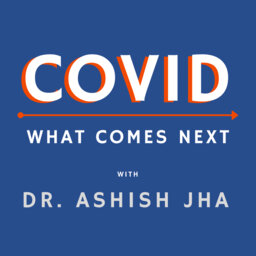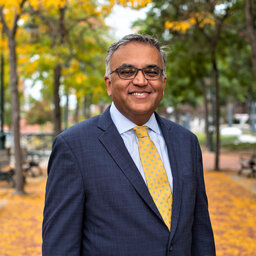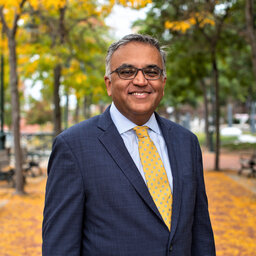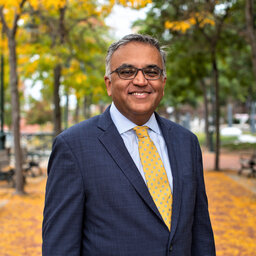Welcome to Episode 15 of “COVID: What comes next,” an exclusive weekly Providence Journal/USA TODAY NETWORK podcast featuring Dr. Ashish Jha, dean of the Brown University School of Public Health and an internationally respected expert on pandemic response and preparedness.
PROVIDENCE – Although some scientists early in the COVID-19 pandemic expressed concern that the disease could be spread on surfaces in addition to airborne transmission, the primary means, subsequent study has shown the risk is minimal, Dr. Ashish Jha said on Tuesday.
“We don't think surfaces are a major source of transmission and I'd be very surprised if there was much transmission happening from surfaces at all,” the dean of Brown University’s School of Public Health said during recording of the national “COVID: What Comes Next” podcast, available from The Providence Journal and the USA TODAY NETWORK.
Jha recounted the early history of concern about surface transmission, saying that with later research, “it turned out that much of the virus we were finding on surfaces were little fragments, not full viable virus.”
The pandemic expert said “imagine if I cough or sneeze and [the coronavirus] gets on a surface. You're going to have little bits of viral fragments sitting around for days but it's not going to affect anybody after a little bit.” An abundance of caution regarding that brief period, however, Jha said, leads to the conclusion that “we still think people should be washing their hands.”
Similarly, Jha said the risk of transmission by other means once thought to play a role in contagion is also low: takeout food and packaging, mail, and food from a store or home-delivery service, for example. “Things like wiping down groceries -- I used to worry about that last March or April,” Jha said. “I don't think I've worried about it since then.” Nonetheless, he does still wash his hands after putting food away.
As for postal deliveries, Jha injected an element of humor into the podcast, saying “don't lick your mail, but presumably you weren't doing that before the pandemic.” The doctor’s practice? He brings his mail in, puts it down, opens it and washes his hands afterwards.
On another topic, Jha discussed people who are living with long COVID-19 – the so-called long haulers, who have passed through the acute phase of coronavirus disease but continue to experience symptoms.
“There are a certain proportion of people who will continue to have symptoms for a very long period of time,” Jha said, for “many, many weeks and often many, many months. The symptoms can vary from fevers and fatigue to almost autoimmune-like symptoms. There are some pretty good studies that suggest maybe it's as much as 25% of people who have ‘recovered’ still feel off.
“They could be having headaches. They could be having extra fatigue 90 days later. And so there is clearly a spectrum of people who recover and are totally back to baseline but a large minority of people who three months later, six months later, are not back to their baseline.”
Jha said that of these, “a small minority” are “really quite disabled and can't get back to work and function.” Research into the mechanisms involved continue, but Jha said this much seems clear: “We don't think it's the virus hanging around in their system anymore. It's the immune system’s response.”
Asked about reports that people who have become reinfected after recovering from an initial bout with coronavirus disease, Jha called that rare but “also not surprising. Almost no disease gives you lifelong what we call ‘sterilizing immunity,’ which is the kind of immunity when you can never get reinfected… But thank goodness it’s pretty uncommon.”
Jha also answered two audience questions.
-- The first concerned “the safety of the vaccine for the millions of people who have weakened immune systems,” as one listener wrote to the podcast.
Jha said the nature of the Pfizer and Moderna vaccines makes it “unlikely to generate any kind of negative effect,” but he did say that for those in this situation, “these are conversations you need to have with your physician about your specific type of immunodeficiency.”
-- The second question was actually two: “Should ibuprofen or Tylenol be avoided prior to receiving the COVID vaccination? What about afterwards?”
Jha said “there is a theoretical argument” that taking them before a shot “may somehow blunt the immune response. I'm pretty skeptical of that.” Nonetheless, he does not recommend using Tylenol or ibuprofen before a shot.
After?
“Once you've had the shot, if you feel lousy, taking Tylenol or Ibuprofen is perfectly reasonable,” Jha said. Some people do report feeling achy or fatigued for several hours after a second dose.
For the dean’s full answers on all of these topics, please listen to the full podcast.
This weekly podcast is hosted by G. Wayne Miller, health reporter for The Providence Journal.
 COVID: What comes next - With Dr. Ashish Jha
COVID: What comes next - With Dr. Ashish Jha


